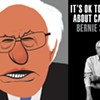Published January 21, 2011 at 1:22 p.m.
Vermont could become the first-in-the-nation legislative body to urge Congress to amend the constitution and ban the court-created notion of "corporate personhood."
On the one-year anniversary of the U.S. Supreme Court decision that many believe granted corporations increased constitutional protections to free speech similar to those of individuals, a Vermont Senate is introducing a resolution to recommend Congress amend the Constitution and make it clear that corporations are not, in fact, people, under federal law.
In its Citizens United ruling last year, the U.S. Supreme Court said corporations, like private citizens, could spend freely on elections. The court ruled that labor unions, too, could spend unlimited amounts.
The Vermont resolution, sponsored by Sen. Virginia "Ginny" Lyons (D-Chittenden) and 11 other Democratic senators, comes on the heels of a Vermont visit by David Cobb, of the group "Move to Amend," who is trying to build a grassroots movement to amend the Constitution in order to roll back court rulings he believes grants too much authority and protection to corporations.
"We could urge Congress to pass a law at the federal level, but we think amending the constitution so that the language is clear that individual rights are only reserved for people is probably the best way to go," said Lyons. The measure, if approved by the Senate, will go to the Senate Judiciary Committee for review. The chairman, Sen. Dick Sears (D-Bennington), is also a cosponsor of the legislation.
Vermont law does allow for corporations to be treated as persons as it pertains to contracts. As well, Vermont's campaign finance law does recognize corporations as people.
A series of protests and press events are being held in Washington, D.C., today on the one-year anniversary of the Citizens United ruling, which granted corporations, and labor unions, the right to unlimited campaign spending in an election cycle. Another case is winding its way through the federal court system that could grant corporations more protection from the release of government investigative records under the guise of "personal privacy" protections granted in the constitution.
One of those groups is Business for Democracy, which has some financial support from Ben & Jerry's. The group launched a national campaign urging business leaders to pledge to keep corporate money out of elections and work to overturn the Citizens United ruling.
"We want to use the first anniversary of this ruling to mobilize the business voice," said Rob Michalak, the director of social mission and PR at Ben & Jerry's. "This is all about the corporate role in our democracy and we're standing next to citizens groups in an effort to overturn Citizens United. Different groups will have different approaches, but for us we believe the ruling goes against some of the basic principles of our democracy. Democracy should be by the people and not by the corporations."
In the past two decades, Cobb notes, federal courts have increasingly granted constitutional protections to corporations that had previously only been granted to individuals, among them the right to unlawful search and seizure, due process and free speech. In several instances, these rulings have shielded corporations from government regulations or public oversight.
Cobb said it's time to push back on those constitutional expansions of protection for corporations and restore the founding document to be one that is focused on people, and not corporations.
"All we're saying is that the U.S. Constitution should protect our individual liberties," said Cobb. "We've been taught that we are a democratic republic and that we the people are sovereign and that we the people rule — not corporations."
There are two ways to amend the U.S. Constitution: an act of Congress, which is then ratified by the states, or two-thirds of the states calling for a Constitutional Convention.
* This post has been updated to include the language of the resolution (below). Also, the resolution was referred to the Senate Government Operations Committee on Friday, not the Judiciary Committee.
The resolution:
J.R.S. 11. Joint resolution urging the United States Congress to propose an amendment to the United States Constitution for the states’ consideration which provides that corporations are not persons under the laws of the United States or any of its jurisdictional subdivisions.
Whereas, free and fair elections are essential to American democracy and effective self-governance, and
Whereas, individual persons are rightfully recognized as the human beings who actually vote in elections, and
Whereas, corporations are legal entities that governments create and can exist in perpetuity and simultaneously in many nations, and
Whereas, they do not vote in elections and should not be categorized as persons for purposes related to elections for public office, and
Whereas, corporations are not mentioned in the United States Constitution as adopted, nor have Congress and the states recognized corporations as legal persons in any subsequent federal constitutional amendment, and
Whereas, during the 1885–1886 United States Supreme Court term, in the midst of oral arguments leading to the decision Santa Clara vs. Southern Pacific Railroad Company, 118 U.S. 394, Chief Justice Waite stated that all the justices agreed that the Fourteenth Amendment’s prohibition on a state denying equal protection to a person applies to a state’s treatment of private corporations, and
Whereas, this brief but extraordinarily significant comment of Chief Justice Waite sanctioned private corporations to sue municipal and state governments for adopting laws that violate a corporation’s rights even when those laws serve to protect and defend the rights of human persons, and
Whereas, the United States Supreme Court has continued to adhere to this legal position in its jurisprudence for over a century, and most recently applied it in its decision Citizens United v. the Federal Election Commission, 130 S.Ct. 876, that eliminated many restrictions, including any total prohibition, on corporate spending in the electoral process, and
Whereas, the Court in Citizens has created a new and unequal playing field between human beings and corporations with respect to campaign financing, negating over a century of precedent prohibiting corporate contributions to federal election campaigns dating to the Tillman Act of 1907, and
Whereas, the Citizens decision has forced candidates for political office to divert attention from the interests and needs of their human constituents in order to raise sufficient campaign funds for election, and Whereas, corporations are not and have never been human beings and therefore are rightfully subservient to human beings and the governments that are their creators, and
Whereas, the profits and institutional survival of large corporations are often in direct conflict with the essential needs and rights of human beings, and
Whereas, large corporations have used their so-called rights to successfully seek the judicial reversal of democratically enacted laws passed at the municipal, state, and federal levels aimed at curbing corporate abuse, and
Whereas, these judicial decisions have rendered democratically elected governments ineffective in protecting their citizens against corporate harm to the environment, health, workers, independent business, and local and regional economies, and
Whereas, large corporations own most of America’s mass media and employ those media to loudly express the corporate political agenda and to convince Americans that the primary role of human beings is that of consumers rather than sovereign citizens with democratic rights and responsibilities, and the United States Constitution to define persons as human beings and not corporations, now therefore be it
Resolved by the Senate and House of Representatives: That the General Assembly urges Congress to propose an amendment to the United States Constitution for the states’ consideration which provides that corporations are not persons under the laws of the United States or any of its jurisdictional subdivisions, and be it further
Resolved: That the Secretary of State be directed to send a copy of this resolution to the Vermont Congressional Delegation.
One or more images has been removed from this article. For further information, contact
[email protected].
More By This Author
Speaking of Blurt
-
Blurt Is No More. Here's Where to Find New Seven Days Content
Sep 17, 2012 -
Alice Eats: The Mill Market & Deli
Sep 11, 2012 -
Grazing at King Arthur Flour's Airy New Digs
Sep 10, 2012 -
Movies You Missed 55: Making Plans for Léna
Sep 7, 2012 -
Quiz: Ben & Jerry's Flavor or Porn Flick?
Sep 6, 2012 - More »
Comments (18)
Showing 1-10 of 18
Comments are closed.
From 2014-2020, Seven Days allowed readers to comment on all stories posted on our website. While we've appreciated the suggestions and insights, right now Seven Days is prioritizing our core mission — producing high-quality, responsible local journalism — over moderating online debates between readers.
To criticize, correct or praise our reporting, please send us a letter to the editor or send us a tip. We’ll check it out and report the results.
Online comments may return when we have better tech tools for managing them. Thanks for reading.













































